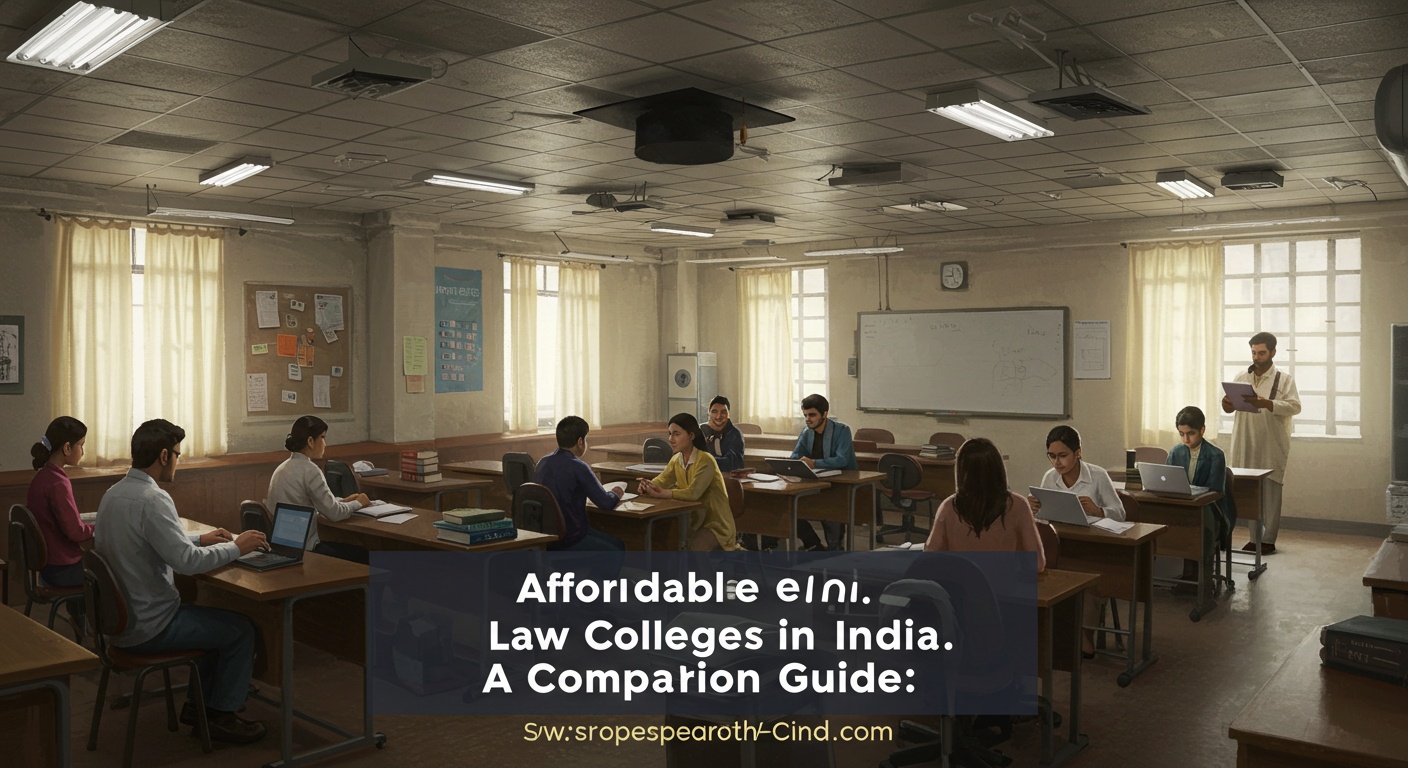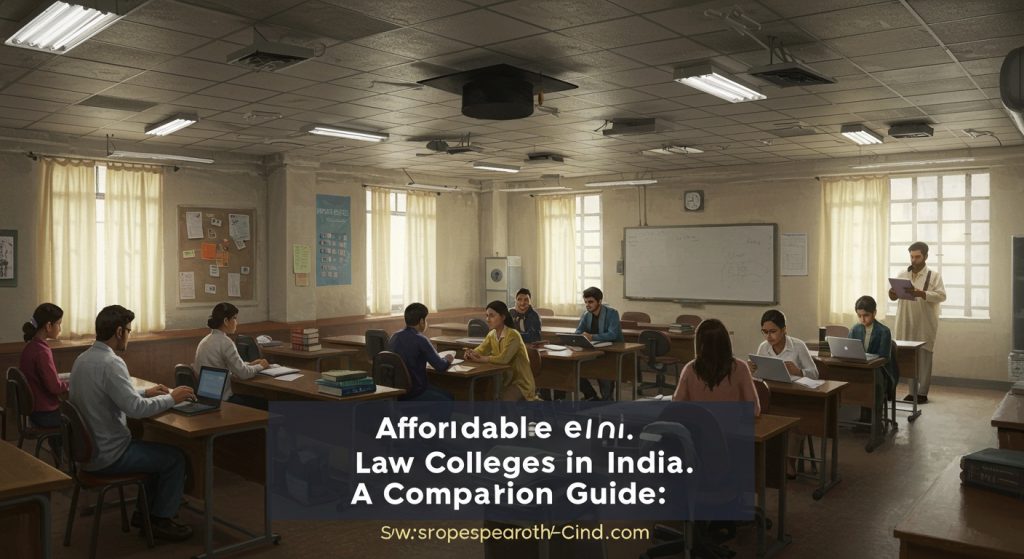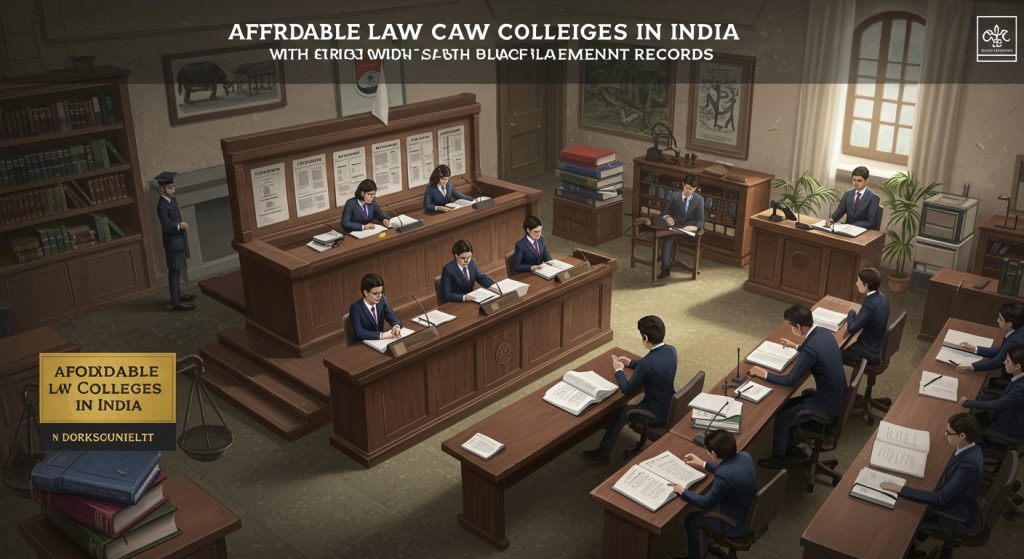Aspiring legal eagles often face a daunting hurdle: the cost of quality legal education. With the rise in demand for skilled lawyers, particularly in emerging fields like fintech and cyber law, securing an affordable yet comprehensive law degree is crucial. This exploration dives into the Indian landscape of affordable law colleges, analyzing factors beyond just tuition fees. We’ll dissect crucial aspects like faculty expertise, infrastructure quality. Placement records to reveal institutions offering the best return on investment. Moreover, we will scrutinize scholarship opportunities and loan programs available to deserving candidates, ultimately empowering prospective students to make informed decisions about their legal education journey, without breaking the bank.

Understanding the Landscape of Affordable Law Education
Pursuing a law degree in India can be a significant investment. But, numerous institutions offer quality legal education at relatively affordable costs. “Affordable” in this context refers to colleges with lower tuition fees, accessible scholarships. Reasonable living expenses. These colleges may be government-funded, grant-aided, or private institutions with a commitment to accessible education.
Key factors defining affordability include:
- Tuition Fees: The primary cost component.
- Hostel and Accommodation: On-campus or nearby off-campus options.
- Scholarships and Financial Aid: Availability and eligibility criteria.
- Location and Living Expenses: Costs of food, transportation. Other necessities in the city.
- Infrastructure and Resources: Library access, moot court facilities. Other academic support.
Government Law Colleges: A Budget-Friendly Option
Government Law Colleges (GLCs) are generally the most affordable option for aspiring lawyers in India. These institutions receive funding from the government, allowing them to offer significantly lower tuition fees compared to private colleges. While the fees are lower, the competition for admission is often very high due to the limited number of seats and the perceived quality of education.
Advantages of GLCs:
- Low Tuition Fees: Often a fraction of the cost of private colleges.
- Experienced Faculty: Many GLCs boast highly experienced and qualified professors.
- Strong Alumni Networks: GLCs often have well-established alumni networks that can be beneficial for career prospects.
- Merit-Based Admissions: Admissions are typically based on merit, ensuring a level playing field.
Disadvantages of GLCs:
- High Competition: Securing admission can be extremely competitive.
- Infrastructure Limitations: Some GLCs may have older infrastructure compared to newer private colleges.
- Bureaucracy: Government institutions may sometimes be subject to bureaucratic processes.
Examples of Affordable GLCs:
- Government Law College, Mumbai
- Government Law College, Chennai
- Faculty of Law, Delhi University
- National Law University, Delhi (While technically a NLU, it’s heavily subsidized)
Private Law Colleges with Affordable Options
While private law colleges generally have higher fees than GLCs, some offer relatively affordable programs and scholarships to deserving students. These colleges often invest in modern infrastructure and offer a wider range of specialized courses.
Factors to Consider When Evaluating Private Law Colleges:
- Accreditation and Recognition: Ensure the college is recognized by the Bar Council of India (BCI) and has relevant accreditations.
- Faculty Profile: Research the qualifications and experience of the faculty members.
- Placement Record: Check the college’s placement record and the types of companies that recruit from the campus.
- Infrastructure and Resources: Evaluate the library, moot court, computer labs. Other facilities.
- Scholarship Opportunities: Inquire about scholarships and financial aid options.
Examples of Relatively Affordable Private Law Colleges:
- Symbiosis Law School (Pune & Noida) – Offers various scholarships
- Jindal Global Law School (Sonipat) – Offers merit-based and need-based scholarships. But, base tuition is still high.
- Amity Law School (Various Locations) – Offers scholarships based on academic performance.
- Alliance School of Law (Bangalore)
National Law Universities (NLUs) and Affordability
National Law Universities (NLUs) are premier law institutions in India, established by state governments. While NLUs offer excellent legal education, their fees are generally higher than GLCs but can be more affordable than some top-tier private law colleges. The cost of studying at an NLU varies depending on the specific institution.
Key Considerations for NLUs:
- Common Law Admission Test (CLAT): Admission to most NLUs is based on the CLAT score.
- Fee Structure: NLU fees typically range from INR 1. 5 Lakhs to INR 3 Lakhs per year.
- Scholarship Programs: Many NLUs offer scholarships and financial aid to meritorious and needy students.
- Location and Accommodation: The cost of living can vary depending on the location of the NLU.
Examples of NLUs and their Approximate Fees:
- National Law School of India University (NLSIU), Bangalore: (One of the most expensive)
- National Law University, Delhi (Subsidized, relatively affordable compared to other NLUs)
- NALSAR University of Law, Hyderabad
- The WB National University of Juridical Sciences (NUJS), Kolkata
Comparative Analysis of Cost and Quality
| College Type | Average Annual Fees (INR) | Quality of Education | Admission Criteria | Placement Opportunities |
|---|---|---|---|---|
| Government Law Colleges (GLCs) | 10,000 – 30,000 | Good to Very Good | Merit-Based (Entrance Exams/Academic Performance) | Moderate to Good (Varies by College) |
| Private Law Colleges | 1,00,000 – 5,00,000+ | Good to Excellent | Entrance Exams, Academic Performance, Interviews | Good to Excellent (Varies by College) |
| National Law Universities (NLUs) | 1,50,000 – 3,00,000 | Excellent | CLAT Score | Excellent |
Strategies for Minimizing Law School Expenses
Even at affordable law colleges, the overall cost of education can be significant. Here are some strategies to minimize expenses:
- Apply for Scholarships: Research and apply for all available scholarships, both merit-based and need-based.
- Secure Education Loans: Explore education loan options from banks and financial institutions.
- Consider On-Campus Accommodation: On-campus accommodation is often more affordable than renting an apartment.
- Buy Used Textbooks: Purchase used textbooks from seniors or online marketplaces.
- Utilize Library Resources: Make full use of the college library to avoid buying expensive reference books.
- Part-Time Jobs/Internships: Explore part-time job or internship opportunities to earn extra income.
- Develop Strong Study Habits: Effective time management and study habits can reduce the need for expensive coaching classes.
If you’re aiming for a career in cyber law, researching programs with robust industry connections is essential. Here’s a relevant link: Cyber Law Degrees: Affordable Options and Top Programs Unveiled.
Beyond Tuition: Understanding Hidden Costs
While tuition fees are a significant factor, it’s crucial to consider the hidden costs associated with law school. These may include:
- Examination Fees: Costs for semester-end exams and other assessments.
- Moot Court Competition Expenses: Travel and accommodation costs for participating in moot court competitions.
- Internship Expenses: Stipends for internships may be low, requiring students to cover their own living expenses.
- Professional Development: Costs for workshops, seminars. Training programs to enhance legal skills.
- Bar Exam Preparation: Expenses for coaching classes and study materials for the Bar Exam.
Conclusion
Choosing the right law college doesn’t have to break the bank. As we’ve explored, affordability in legal education in India isn’t just about tuition fees; it’s about the return on investment concerning placements, faculty expertise. The strength of the alumni network. Consider institutions that offer comprehensive scholarship programs and actively facilitate internships, bridging the gap between academic knowledge and practical application. The road ahead requires careful evaluation of your career aspirations. Are you drawn to corporate law, litigation, or perhaps human rights advocacy? Align your college choice with your specific interests, as some institutions excel in particular areas. Look beyond rankings and visit campuses, talk to current students. Gauge the learning environment firsthand. Remember, your law degree is an investment in your future. With diligent research and strategic planning, you can unlock a fulfilling and impactful legal career without accumulating insurmountable debt. Embrace the challenge, stay focused on your goals. Prepare to make a difference in the world through the power of law.
FAQs
So, I’m on a budget. I REALLY want to study law in India. Are there actually good, affordable options, or am I dreaming?
You’re definitely not dreaming! While the really ‘famous’ law schools can be pricey, there are plenty of reputable and affordable law colleges in India. It’s all about knowing where to look and understanding what ‘affordable’ means for you.
Okay, ‘affordable’ is subjective. What kind of fees are we talking about for these cheaper law colleges?
Good point! Generally, you can find options with annual fees ranging from ₹30,000 to ₹1,50,000. This is considerably lower than the private NLUs or top-tier private colleges. Government law colleges usually fall on the lower end of that spectrum.
Besides fees, what else should I consider when judging if a law college is ‘affordable’?
Think about the cost of living in the city where the college is located. Accommodation, food, transportation – these all add up! Also, consider the availability of scholarships or fee waivers, as these can significantly reduce your financial burden.
Are government law colleges necessarily ‘better’ just because they’re cheaper?
Not necessarily ‘better’ overall. Government colleges often have experienced faculty and a strong alumni network. They might lack some of the modern infrastructure or specialized programs that private colleges offer. It’s about finding the right fit for your learning style and career goals.
Do these affordable law colleges still offer decent placements after graduation?
Placement records can vary widely. Some affordable colleges have strong ties to local law firms and government agencies, leading to good placement opportunities. Research the specific college’s placement statistics and talk to current students or alumni if possible. Don’t just rely on the college’s website!
What are some examples of affordable law colleges worth checking out in different parts of India?
That depends on where you are willing to move to! Some notable examples could include government law colleges in various states, or some private law colleges in smaller cities that offer lower fees. It’s best to research colleges specific to the region you are willing to study in.
Is it worth sacrificing a ‘brand name’ law school for an affordable option? Will it hurt my career?
That’s a tough question and depends on your individual circumstances. A ‘brand name’ can open doors. Ultimately, your skills, work ethic. Networking will determine your success. If you excel at an affordable college, gain practical experience through internships. Build a strong network, you can absolutely thrive!



